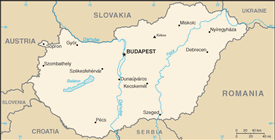Hungary
 Hungary is country of Europe located in central Europe.
Hungary is country of Europe located in central Europe.
Details
| Official Name: | Hungary |
| Capital: | Budapest |
| Total area: | 93 030 km2 |
| GDP per capita: | $19,637 |
| Native Language: | Hungarian |
| Government: | Parliamentary republic |
| Population: | 8,414,638 |
| Major Religion: | Roman Catholicism, Calvinism |
| Monetary Unit: | Forint (HUF) |
Hungary is a landlocked state with many neighbours – Slovakia, Ukraine, Romania, Serbia, Croatia, Slovenia and Austria. It is mostly flat, with low mountains in the north. Lake Balaton, a popular tourist centre, is the largest lake in central Europe.
The ancestors of ethnic Hungarians were the Magyar tribes, who moved into the Carpathian Basin in 896. Hungary became a Christian kingdom under St Stephen in the year 1000. The Hungarian language is unlike any of the country’s neighbouring languages and is only distantly related to Finnish and Estonian.
The capital city, Budapest, was originally was two separate cities: Buda and Pest. It straddles the River Danube, is rich in history and culture and famed for its curative springs. Hungary has a single-chamber parliament or national assembly whose 386 members are elected by voters every four years.
Hungary has some limited natural resources (bauxite, coal, and natural gas), as well as fertile soils and arable land. Hungarian wines are enjoyed throughout Europe. The country‘s main manufactured exports include electric and electronic equipment, machinery, foodstuffs and chemicals.
Hungary is a highly musical country whose traditional folk music inspired such great national composers as Liszt, Bartók and Kodály. Other famous Hungarians include Albert Szent-Györgyi, who discovered the existence of Vitamin C, writer and Nobel Prizewinner Imre Kertész and Oscar-winning film director István Szabó.
Health & Welfare
The Public Health Act of 1972 guarantees that all people receive free medical care as a right of citizenship. The Social Insurance Act of 1975 further states that insurance conditions and benefits are uniformly applied to all citizens.
Economy & Jobs
Agriculture, mining, manufacturing, energy, and tourism.
Main Attractions
Budapest, Eger town and Lake Balaton
Economy
The economy of Hungary is a medium-sized, high-income, structurally, politically and institutionally open economy, which is part of the European Union's (EU) single market. The economy of Hungary experienced market liberalization in the early 1990s as part of the transition from a socialist economy to a market economy, similarly to most countries in the former Eastern Bloc. Hungary is a member of the Organisation for Economic Co-operation and Development (OECD) since 1995, a member of the World Trade Organization (WTO) since 1996, and a member of the European Union since 2004. Hungary hosts the first foreign office of the China Investment Promotion Agency (CIPA).
The private sector accounts for more than 80% of the Hungarian gross domestic product (GDP). Foreign ownership of and investment in Hungarian firms are widespread, with cumulative foreign direct investment worth more than $70 billion. Hungary's main industries are mining, metallurgy, construction materials, processed foods, textiles, chemicals (especially pharmaceuticals), and motor vehicles. Hungary's main agricultural products are wheat, corn, sunflower seed, potatoes, sugar beets; pigs, cattle, poultry, and dairy products.
In foreign investments, Hungary has seen a shift from lower-value textile and food industry to investment in luxury vehicle production, renewable energy systems, high-end tourism, and information technology.
Immigration and residency
If you are interested in moving to the countries, either with a residence permit or by acquiring a citizenship, please contact us, and also get acquainted with the relevant migration documents.